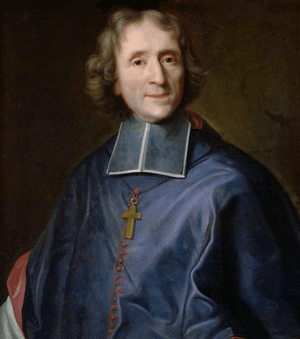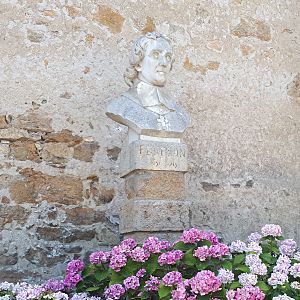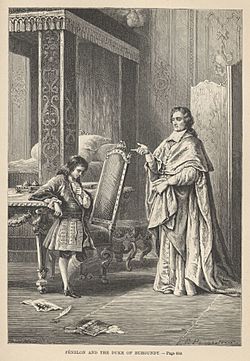François Fénelon facts for kids
Quick facts for kids His Grace François Fénelon, P.S.S |
|
|---|---|
| Archbishop of Cambrai | |

Portrait by Joseph Vivien
|
|
| Church | Roman Catholic |
| Archdiocese | Cambrai |
| See | Old Cambrai Cathedral |
| Enthroned | 30 May 1695 |
| Reign ended | 7 January 1715 |
| Predecessor | Jacques-Théodore de Bryas |
| Successor | Jean d'Estrées |
| Personal details | |
| Born | 6 August 1651 Sainte-Mondane, France |
| Died | 7 January 1715 (aged 63) Cambrai, France |
| Occupation | Theologian, writer, tutor |
| Alma mater | Collège du Plessis |
François Fénelon (born August 6, 1651 – died January 7, 1715) was a French Catholic archbishop, religious thinker, poet, and writer. He is best known today for his book The Adventures of Telemachus, which came out in 1699.
Contents
Early Life and Education (1651–1675)
François Fénelon was born on August 6, 1651, at the Château de Fénelon in Sainte-Mondane, France. His family, the La Mothe-Fénelons, had a long history of leaders in both the church and the government.
He was taught at home by private tutors. They made sure he learned a lot about ancient Greek and Latin languages and literature.
In 1663, when he was 12, Fénelon went to the University of Cahors. There, he studied rhetoric (the art of speaking and writing well) and philosophy.
When he showed interest in becoming a priest, his uncle helped him study at the Collège du Plessis in Paris. He was so talented that at age 15, he was asked to give a public sermon. Around 1672, Fénelon joined the Séminaire de Saint-Sulpice, a special school for future priests in Paris.
Becoming a Priest (1675–1685)
Around 1675, Fénelon became a priest. At first, he dreamed of being a missionary far away in the East. However, his friends encouraged him to preach in local churches instead. He quickly gained a reputation for being a very good speaker.
In 1679, the Archbishop of Paris chose Fénelon to lead Nouvelles-Catholiques. This was a community in Paris for young Protestant girls who were learning about the Catholic Church.
In 1681, he published an important book called Traité de l'éducation des filles (Treatise on the Education of Girls). This book gave advice on how to raise girls and became very popular. From 1681 to 1695, Fénelon was also in charge of a strong monastery in Carennac.
Working with Protestants (1686–1687)
During this time, Fénelon became friends with Jacques-Bénigne Bossuet, who would later become his rival. In 1685, King Louis XIV took back the Edict of Nantes. This law had given Protestants (called Huguenots) some rights. After the law was removed, the Church sent great speakers to parts of France with many Protestants. Their goal was to convince them to become Catholic.
Fénelon was one of these speakers. He spent three years preaching to Protestants in the Saintonge region. He asked the king to remove soldiers from the area. He wanted to avoid using force to make people change their religion. However, he also believed that sometimes people needed to be pushed to consider the truth.
Important Friendships and Writings (1687–1689)
Fénelon helped Bossuet with his lectures on the Bible at the Palace of Versailles. During this time, Fénelon wrote a book criticizing some ideas about optimism and creation. This book was not published until long after he died.
He also became friends with important nobles like the Duc de Beauvilliers and the Duc de Chevreuse. He wrote a book called Treatise on the Existence of God.
In 1688, Fénelon met his cousin, Jeanne Marie Bouvier de la Motte Guyon, also known as Madame Guyon. He was very impressed by her deep religious faith. He became her follower and defended her spiritual ideas, which were part of a movement called Quietism.
Royal Tutor (1689–1697)
In 1689, King Louis XIV chose Fénelon to be the tutor for his grandson, the seven-year-old Louis, Duke of Burgundy. This duke was second in line to become king of France. This job gave Fénelon a lot of influence in the royal court.
As a tutor, Fénelon's job was to help shape the character of a future king. He wrote several important books especially for the young duke, including his Fables and Dialogues des Morts.
His most famous work for the duke was Les Aventures de Télémaque (The Adventures of Telemachus), written in 1693–94. This book was about Ulysses' son, Telemachus. But it was also a strong criticism of the idea of absolute monarchy, where a king has total power. Fénelon believed that "Good kings are rare and the generality of monarchs bad."
The Adventures of Telemachus became a huge bestseller in France and other countries. It was translated into many languages and inspired other books, operas like Mozart's Idomeneo, and even wallpaper designs!
Many people believed that Fénelon's teaching greatly improved the young duke's behavior. The duke, who had been a spoiled and violent child, learned self-control and understood his future duties as a ruler. The book showed Fénelon's ideas for a less powerful and more balanced monarchy after Louis XIV.
In 1693, Fénelon was chosen to be a member of the Académie française, a very important French organization for language and literature. In 1694, the king gave him a profitable job as Abbot of Saint-Valery-en-Caux.
In the mid-1690s, Françoise d'Aubigné, marquise de Maintenon, the king's wife, often asked Fénelon for advice. She also sought his help with the Saint-Cyr school she was starting for girls.
In February 1696, the king made Fénelon the Archbishop of Cambrai. He also asked him to continue tutoring the Duke of Burgundy. Fénelon accepted, and his old friend Bossuet officially made him an archbishop in August.
Later Years as Archbishop

As the Archbishop of Cambrai, Fénelon spent most of his time at the archbishop's palace. However, he also spent several months each year visiting churches and other religious places in his area. He preached in his main church on special days. He was very interested in training new priests and checking their readiness before they became ordained.
During the War of the Spanish Succession, soldiers were in his archdiocese. But they never stopped him from doing his duties as archbishop. The war created many refugees, and Fénelon opened his palace to help those fleeing the fighting.
In his later years, Fénelon wrote many works against a religious movement called Jansenism. He argued against their ideas, and his writings helped lead to a decision by Pope Clement XI in 1713 that condemned some of these opinions.
Even though he was mostly in Cambrai, Fénelon continued to guide important people spiritually. This included Mme de Maintenon, the ducs de Chevreuse and de Beauvilliers, and the Duke of Burgundy.
Many of Fénelon's close friends died in his later years, which saddened him. He passed away on January 7, 1715.
Fénelon as a Reformer and Defender of Rights
Fénelon wrote about the dangers of too much power in government. He believed in universal human rights and that all people are connected.
He also thought that educating women was very important. He believed that well-educated women could help improve society.
The world is not an idea; it is made up of families. And who can make it better than women? . . . What women do is almost as important to society as what men do. Women have a home to manage, a husband to make happy, and children to raise well . . . We must think not only about the good women do when they are well brought up, but also the harm they cause when they lack an education that teaches them to be good...
Key Writings
- The Adventures of Telemachus
- Treatise on the Education of Daughters
- Dialogues of the dead
- Lives of the ancient philosophers
- Christian Perfection
- The Existence of God
- Let Go
- The Royal Way of the Cross
- Maxims of the Mystics
- The Inner Life
- Spiritual Letters (2 volumes, letters to men; letters to women, Rivingtons, London, 1877)
Further Reading
- H. L. Sidney Lear, Fenelon, Archbishop of Cambrai: A Biographical Sketch (London, 1877)
- Stafford Harry Northcote, Viscount Saint Cyres, François de Fénelon (London: Methuen & Co., 1901)
See also
 In Spanish: François Fénelon para niños
In Spanish: François Fénelon para niños
- Human rights
- Christian mysticism
- François de Salignac de la Mothe-Fénelon (missionary) - half brother and missionary
 | Victor J. Glover |
 | Yvonne Cagle |
 | Jeanette Epps |
 | Bernard A. Harris Jr. |


